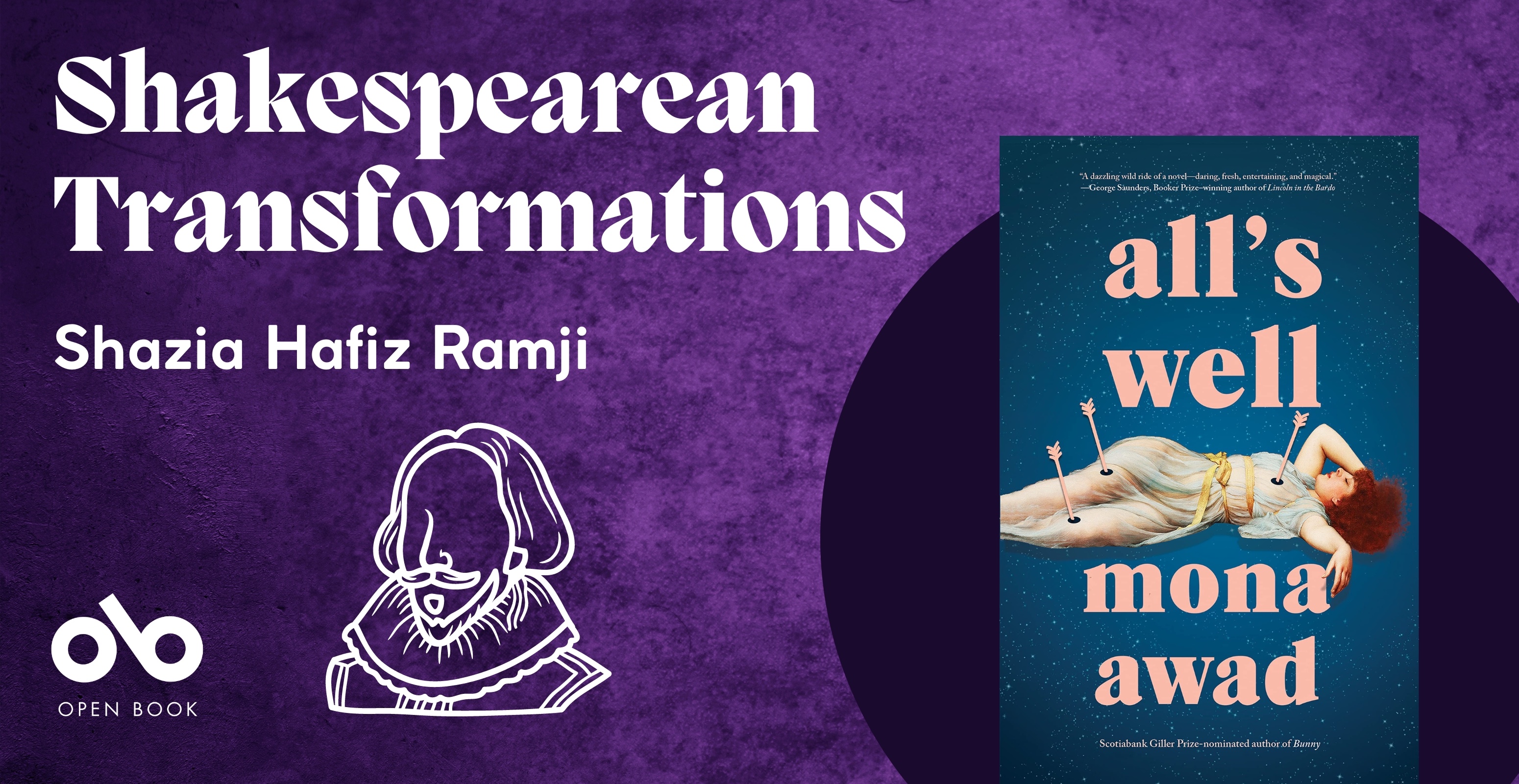Shakespearean Transformations: All’s Well by Mona Awad
By Shazia Hafiz Ramji
Mona Awad’s 2021 novel, All’s Well, follows a drama professor suffering from chronic pain. She’s staging one of Shakespeare’s plays, All’s Well That Ends Well, which is about an orphan named Helen who heals a king in exchange for his son’s hand in marriage. Though Miranda Fitch is putting on All’s Well, another Shakespeare play changes the course of her life.
In the opening of Shakespeare’s Macbeth, Macbeth and his friend Banquo meet three witches. The witches prophesy that Macbeth will garner another title (“Thane of Cawdor”) and become king. Soon enough, Macbeth receives news that he has been appointed the Thane of Cawdor. Shortly after, with the help of Lady Macbeth, he begins to think about how to kill King Duncan to fulfill the witches’ prophecy of him being the “king hereafter.”
Like Macbeth, Miranda encounters three witches – in the form of three men at the pub that she visits on a night when her pain is the worst and when she considers suicide. This is a significant chapter in the novel because everything changes after it. In the first third of the story prior to this chapter, Miranda is bitter and in pain; the book begins with her lying on the floor of her office watching a commercial about pain medication. Through Awad’s remarkably layered dialogue, we get a sense of Miranda’s internal voice, which is judgemental, self-deprecating, and envious of others. After she meets the three witchy men at the pub, one of whom grasps her wrist, she feels the extent of her pain so deeply that she cannot speak.
“And then the fat man reaches out his hand and grips my wrist. Blue skies in my blood blacken. […] I hear a voice from the speakers. […] Who’s that? I want to ask, but to even think the question hurts in a way I’ve never known. You thought you knew pain, says a voice inside. Cryer of wolf. Wolf, wolf, wolf. Well, here is the wolf at last. The teeth at my throat, the claws sinking in.”
The wrist grip, it turns out, is magical. It enables Miranda to pass on her pain to others – which she does when a student undermines her and garners the favour of others to stage Macbeth instead of All’s Well (Macbeth appeals to the students for its action-packed drama, which includes witches, murder, and suicide). When the student accidentally drops the pages during a rehearsal and Miranda touches her arm, the student falls ill and returns with a limp, just like Miranda (whose limp disappeared after her encounter with the three witchy men). In a stunning transformative scene during rehearsal, Miranda reclaims her authority and stands up for herself. She is unrecognizable in the second third of the novel, where she lives with gusto and has sex with the handsome ex-convict set designer, Hugo.
The novel’s genre changes drastically after the Macbeth-inspired scene at the pub; it becomes infused with the supernatural and fantastical, giving Awad the flexibility to create a nuanced, feverish, and ecstatic conclusion, which returns Miranda to confront what was unhealed within her.
All’s Well is a stunning novel that reminds us that healing is never linear. It also renders the magic of art, particularly the power of words to have actions in the world, which is also one of the themes of Macbeth. In All’s Well, we glimpse this effect through the changes in Miranda’s internal dialogue and her seemingly miraculous transformations and healing after meeting the witchy men. In Macbeth, self-fulfilling prophecy leads Macbeth to his demise (“thy words become thee as thy wounds”).
By entangling with Macbeth, Miranda receives the antagonism and change needed to help her confront several originary wounds. Writing in A Theory of Adaptation, Linda Hutcheon cites Walter Benjamin who says that “storytelling is always the art of repeating stories.” Wounds, like stories, require occasions of awakening (or triggering) in order to prompt recognition (and healing). This is why storytelling is indeed the art of repeating stories. Awad’s adaptation of Shakespeare is more than an intertextual trip with the works of a long-dead canonized bard. It is a matter of the right story at the right time.
A character in Emily St. John Mandel’s Station Eleven recognizes this too. In the novel that follows a travelling Shakespeare troupe in the wake of a swine flu that kills almost everyone, “why Shakespeare?” is a valid question.
“She remembered Dieter talking to her about Shakespeare, Shakespeare’s works and family, Shakespeare’s plague-haunted life.
Your CanLit News
Subscribe to Open Book’s newsletter to get local book events, literary content, writing tips, and more in your inbox
“Wait, do you mean he had the plague?” she asked.
“No,” Dieter said, “I mean he was defined by it. I don’t know how much schooling you’ve had. Do you know what that means, to be defined by something?”
Station Eleven is in the running for Canada Reads 2023. I can only hope the conversation recognizes the role of art in a pandemic and that it never veers into something of this sort.
The views expressed by Open Book columnists are those held by the authors and do not necessarily reflect the views of Open Book.
Shazia Hafiz Ramji’s fiction was shortlisted for the Malahat Review’s 2022 Open Season Awards. Her poetry was shortlisted for the 2021 National Magazine Awards and the 2021 Mitchell Prize for Faith and Poetry. Shazia’s award-winning first book is Port of Being. She lives in Vancouver and Calgary, where she is at work on a novel.


